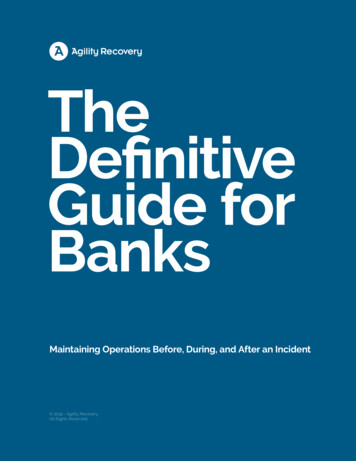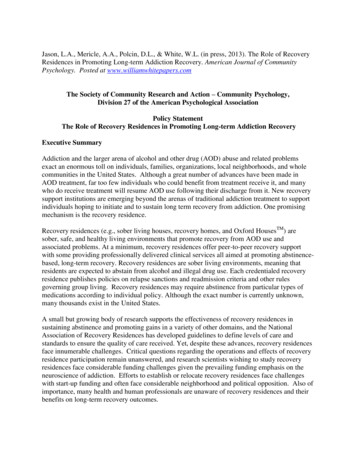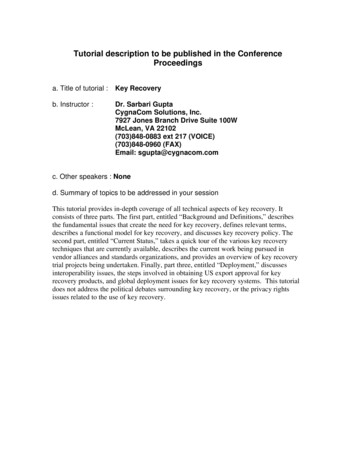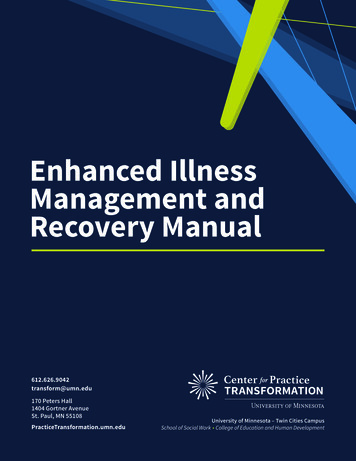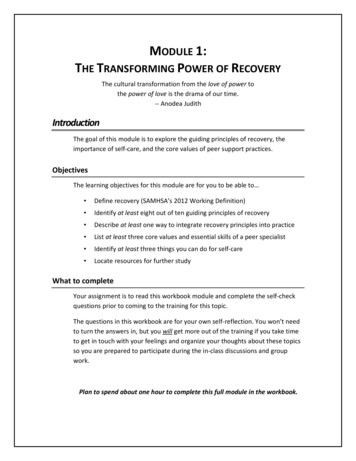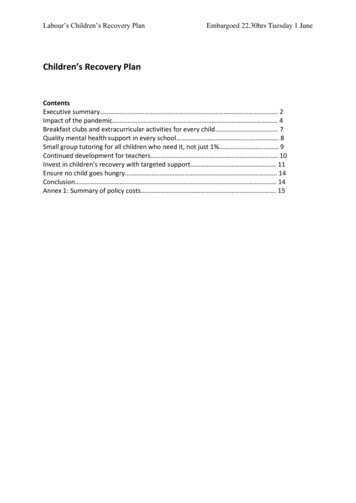
Transcription
Labour’s Children’s Recovery PlanEmbargoed 22.30hrs Tuesday 1 JuneChildren’s Recovery PlanContentsExecutive summary 2Impact of the pandemic . 4Breakfast clubs and extracurricular activities for every child . 7Quality mental health support in every school . 8Small group tutoring for all children who need it, not just 1% 9Continued development for teachers . 10Invest in children’s recovery with targeted support . 11Ensure no child goes hungry . 14Conclusion . 14Annex 1: Summary of policy costs . 15
Labour’s Children’s Recovery PlanEmbargoed 22.30hrs Tuesday 1 JuneExecutive SummaryIn March 2020, the Covid-19 pandemic forced the education system to transform overnight;schools had to close their doors to the vast majority of children and provide remote learningto millions of pupils. School leaders, teachers, parents and children rose to the challenge;from parents transforming their working day to home school their children to education staffhand delivering workbooks and meal packages. There is no doubt that at a time of greatchallenge, the education system demonstrated its role as a vital public service, and childrendemonstrated their resilience.That this enormous effort took place despite the Conservative government, not because of it,should be a source of shame. Over the course of the pandemic, the Conservatives havetreated the nation’s children as an afterthought, consistently failing to safeguard theirwellbeing and learning. They caused chaos for A-level, GCSE and BTEC pupils last summer,1and then failed to put a plan in place for this year’s exams until only weeks before they weredue to go ahead. They had to be dragged kicking and screaming to provide free school mealsin the holidays, and when they were eventually delivered, government guidance suggested apitiful amount of food be included. 2 Over a million children were left without adequate accessto an electronic device for months, unable to partake in remote learning.3Not only have the Conservatives failed the nation’s children over the course of the pandemic,the last year has exposed the failures of a decade of Conservative governments which haveheld back young people’s life chances. Class sizes are soaring with one in seven secondarypupils now in classes of over 30,4 whilst schools have face per pupil funding cuts of 9%, thebiggest in 40 years.5 Spending on 16 – 19 education has been cut by a fifth,6 hitting learnernumbers. A thousand childcare providers have been forced to close,7 reducing opportunitiesfor our youngest children. Latest statistics show that 700,000 children have been pushed intopoverty since 2010,8 and in the last year half a million children are estimated to have becomeeligible for free school meals.9 The Conservatives should be ashamed of this record.1BBC News. Exams chaos: Never again, say parents, pupils, teachers. 512The Guardian. Fresh U-turn over free school meals as Labour criticises guidance on parcels. ur-criticisesguidance-on-parcels3The National Audit Office. Support for children’s education during the early stages of the Covid-19 pandemic.(2020). s-education-during-the-covid-19pandemic/?utm source Twitter&utm medium social&utm campaign Orlo&utm content Support for education4Department for Education. Schools, pupils and their characteristics. (2020). istics5Institute of Fiscal Studies. 2020 annual report on education spending in England. ouse of Commons Library. 16-19 education funding in England since 2010. ch-briefings/sn07019/7Smith G, Sylva K, Smith T, Sammons P, Omonigho A. STOP START: Survival, decline or closure?Children’s centres in England, 2018. 8/04/StopStartFINAL.pdf8Department for Work and Pensions. Children in low income families: local area statistics: FYE 2015 to FYE2020. (2021). statistics-fye-2015-to-fye-20209The Independent. Labour estimates over half a million children have become eligible for free school mealsduring the pandemic. (2021). e-school-meals-coronaviruslabour-b1853763.html
Labour’s Children’s Recovery PlanEmbargoed 22.30hrs Tuesday 1 JuneIn contrast, Labour’s vision is to make Britain the best place to grow-up, by prioritisingchildren’s wellbeing, education and life chances. Over the last twelve months, Labour hasconsistently called for more support for children, young people, parents and all those whowork in our education system. From calling for the provision of free school meals in thesummer holidays and the provision of breakfast clubs for every child, through to getting Covidmitigations in place in schools and a circuit breaker lockdown in October to minimisedisruption to schooling and a ‘Plan B’ for this year’s exams in November 2020.As we look to the nation’s recovery, Labour is clear that an ambitious plan for children mustbe at its’ heart. Yet, the Conservatives’ current ‘catch-up’ plan shows no ambition for ourchildren’s futures. Their failing tutoring programme is reaching just 1% of children,10 they areignoring parents’ concerns with no offer to support children’s wellbeing and have nothing tooffer for the education workforce, which has gone the extra mile to support pupils this year.11It speaks volumes that Boris Johnson and Rishi Sunak were willing to spend more on the illfated Eat Out to Help Out scheme than they are doing on our children’s recovery. 12 Such afailure to act will cost our children and our country, with estimates putting the cost to theeconomy at as much as 420 billion.13Labour has an ambitious vision for every child, teenager and young adult growing up in theUK. This report builds on the vision Keir Starmer set out at Labour Connected in 2020: to closethe education gap so every child’s future is be determined by their potential, not theirpostcode.14The package of measures set out in this report give schools the resources to provide everychild with new opportunities to socialise, learn and develop post-pandemic; working toreverse the gap in learning which has widened during the pandemic ensuring every chancehas the chance to reach their potential. With extracurricular activities, mental health supportin schools and small group teaching available to all pupils who will benefit, Labour willprioritise children’s wellbeing and social development as an essential part of supportinglearning. Children and young people are excited to back with their friends in school and feelambitious and optimistic about their futures. Labour’s plan matches this ambition, puttingchildren at the heart of our national recovery.10Education Select Committee. Oral evidence: Accountability hearings, HC 262. ce/2142/pdf/11Department for Education. New education recovery package for children and young people. le12House of Commons Library. Eat Out to Help Out Scheme. ch-briefings/cbp-8978/13Education Policy Institute. Analysis paper: preliminary research findings on education recovery. 1.pdf14Labour Party. Full text of Keir Starmer’s speech at Labour Connected. (2020). ers-speech-at-labour-connected/
Labour’s Children’s Recovery PlanEmbargoed 22.30hrs Tuesday 1 JuneLabour’s Children’s Recovery Plan: Breakfast clubs and new activities for every child: boost time for children to playand socialise after months away from their friends by enabling schools to offer anexpanded range of extracurricular activities, from breakfast clubs to sport anddrama, book clubs and debating societies;Quality mental health support in every school: give every child the support theyneed to transition back to school and manage personal challenges, with access toqualified in-school counselling staff alongside boosting wellbeing through extraactivities;Small group tutoring for all who need it, not just 1%: make small group teachingavailable to all children who need it not just 1%, by reforming the Government’sfailing tutoring programme to no child falls behind because of pandemicdisruption;Continued development for teachers: Teachers and school staff have had one ofthe toughest years of their careers - it is only by supporting them with training tostay on top of the latest knowledge and techniques that we can give every child abrilliant classroom experience;Invest in an Education Recovery Premium: support every child to reach theirpotential by investing in children who have faced the greatest disruption during thepandemic from early years to further education, and double the Pupil Premium forchildren in key transition years, delivering additional support for children who needit most;Ensure no child goes hungry: ensure no child goes hungry during the pandemic byextending free school meals over the holidays, including the summer holiday.Impact of the PandemicLabour’s vision is for Britain to be the best country to grow-up in, where every child,whatever their background or circumstances, is able to fulfil their potential. This means thata world-class education must be the right of every child, with staff who are valued and ableto support their learning, in an education system that allows every young person to succeed.Labour’s ambition goes beyond the classroom to provide a healthy breakfast to every childand delivering access a broad range of extracurricular activities, including music, arts, sport,drama and more.The government’s failure to support schools and families through the coronavirus pandemichas caused the most significant disruption to children’s learning and development inpeacetime, with millions of children isolated from their friends, out of the classroom andfacing huge challenges in adapting to growing up in a pandemic.The Children’s Commissioner for England has previously said that 850 million days of inperson school were missed by the middle of February this year, averaging half a year away
Labour’s Children’s Recovery PlanEmbargoed 22.30hrs Tuesday 1 Junefrom school.15 The impact of this on children’s social development, wellbeing and educationis dramatic with young people missing out of time with friends and the structure the schoolday provides.A wide range of evidence has shown that children and young people’s wellbeing and mentalhealth has been adversely affected by the pandemic. Analysis by the Health Foundation hasfound a significant increase in the number of young people reporting negative feelings overa wide range of subjects. Around 45% reported feeling depressed in April 2020, compared tounder a third in 2017/18. The proportion of young people reporting that they were losingsleep, struggling to make decisions, or even feeling worthless all rose sharply over thisperiod, showing the profound impact of the pandemic on a generation of young people.16Parents have identified their children’s wellbeing and social development as a key concernfor our recovery. Recent research found that 89% of mums felt lockdown took a big toll onthe mental health of children and young people, and 77% of mums are more worried aboutchildren missing out on social skills as result of lockdown.17 Labour understands thatsecuring children’s wellbeing is a priority to ensure every child has a happy, fulfillingchildhood and goes hand in hand with addressing lost learning.Equally, the impact of this time away for the classroom on children’s learning cannot beoverstated, and it is clear that the scale of lost learning will have huge impacts on childrenacross the country. This impact is especially acute for children already growing up withparents struggling to make ends meet or living in overcrowded accommodation, many ofwhom have not been able to access learning remotely in the same way as their peers. TheInstitute for Fiscal Studies found that the richest third of children spent hours more timelearning every week than their most disadvantaged peers.18The central estimate by the Education Policy Institute is that children are now 3-4 monthsbehind where they should be in their learning, but that this could be higher depending onthe effectiveness of remote learning.19 This means that if pupils have particularly struggledto access remote learning – as we know the most disadvantaged pupils have – they could beeven further behind in their learning. This was not inevitable. The government failed tosupport families, delaying for months providing the resources children needed to learnremote and failing to get free school meal vouchers to families quickly in the first lockdown.Without this support in place, it is no surprise that recent research has found the disruptionThe Children’s Commissioner. Building Back Better; Anne Longfield’s Final Speech as Children’sCommissioner. ft-behindchildren/16The Health Foundation. Generation COVID-19: Building the case to protect young people’s future health,(2020). p5. -08/Generation%20COVID-19.pdf,17Britainthinks. Mums in lockdown. (2021) 03/BT-andMN Mums-and-lockdown webinar-deck 11.03.21 For-publication.pdf18Institute for Fiscal Studies, Family time use and home learning during the COVID-19 lockdown, 21September cation Policy Institute, Education recovery and resilience in England: Phase one report, 14 May /Education-Recovery EPI.pdf, p1015
Labour’s Children’s Recovery PlanEmbargoed 22.30hrs Tuesday 1 Juneto pupils’ learning has widened the attainment gap, a particularly concerning finding giventhat progress in closing the gap had crawled to a halt even before the pandemic began.20The time learning that children have lost could have huge consequences for their learning inthe years ahead and, further in their future, for their opportunities and incomes in thelabour market. Levels of education are a key determinant of income in later life, whichmeans that the level of disruption that children have faced in the last year could remainwith them over the course of their working lives, leading to lower wages for individuals, anda less prosperous and less equal economy for us all.Research by the Education Policy Institute has found that the level of learning that pupilshave lost could translate to, in their central scenario, lost earnings of 2.4%. Given the rangeof potential estimates for lifetime earnings, this could see those who are children todaylosing between 18,000 and 37,000 over the course of their working lives.21 The sameanalysis shows that the cost to our economy could run in to the tens of billions of pounds ormore, with a forecast of lost GDP ranging from 150 billion to 296 billion in the centralscenario.The pandemic has also accelerated the use of technology in education and changed the waywe teach. As children return to school, we must consider how to maintain the best elementsof this technological revolution in teaching to support children’s learning both in school andthrough homework.The pandemic has thrown into sharp relief many of the deep inequalities that a decade ofConservative governments has embedded into our society, our economy, and sadly, oureducation system. But as we emerge from the pandemic in the months and years ahead,there is an opportunity to rebuild our education system on stronger foundations.Throughout the challenges of the last year schools, pupils, families, and communities havecome together in the face of unprecedented disruption to keep children safe, secure, andlearning. We must build on this spirit in the years to come to ensure that every child is giventhe opportunity to fulfil their potential.Addressing the impact of the pandemic on this generation of young people is essential, fortheir life chances, their wellbeing, and for our wider society and economy. It must be at theheart of a national recovery if we are to avoid the creation of a “COVID generation”, withfewer opportunities and poorer outcomes than those who came before. In responding tothe pandemic, we must match the ambition that children have for their own futures and riseto the challenge of every family and every society: to give our children greater opportunitiesthan we ourselves have had.20NFER / EEF, Impact of school closures and subsequent support startegies on attainment and socio-emotionalwellbeing in Ky ey Stage 1: Interim Paper 1i, January ublic/files/Publications/Covid19 Resources/Impact of school closures KS1 interim findings paper - Jan 2021.pdf, p1221Education Policy Institute, Education recovery and resilience in England: Phase one report, 14 May /Education-Recovery EPI.pdf, p11
Labour’s Children’s Recovery PlanEmbargoed 22.30hrs Tuesday 1 JuneBreakfast clubs and extracurricular activities for every childSchools should offer an expanded range of extracurricular activities and breakfast clubsto provide new opportunities for every child to play, learn and develop post-Covid.Children are excited to be back with their friends after the isolation of lockdown whileparents have told us they are concerned about the pandemic’s impact on socialdevelopment. Labour’s plan will reflect this excitement and build a programme of new funactivities around the school day, giving all young people the time to play and socialise withfriends that parents want to see.In March, Labour called for breakfast clubs to be available for all children building extra timewith friends and teachers into the school day, while ensuring every child has a healthy mealgiving them the energy to learn. These clubs would support children’s wellbeing postpandemic and build extra time to socialise with friends into the school day, while also givingschools time to provide targeted tuition or learning support. Breakfast clubs can boostchildren’s educational attainment with positive impacts on reading and writing.22 23We propose this principle be expanded to enable schools to offer a range of afterschoolextracurricular activities, as well as some targeted learning support. This would cover a fullrange of enriching activities that would build time for children time to socialise and enjoynew activities, from music and drama to sports and outdoor activities, into their everydayschool experience. Schools would be able to build on the afterschool activities that some arealready providing to establish a programme of activities which are suitable for their pupilsand school sites.Such targeted programmes can also help accelerate pupil’s academic progress, deliveringtwo months of additional progress which rises to around three months for pupils fromdisadvantaged backgrounds.24 This would help to overcome the impact of the last year onpupil’s learning, without adding extra pressure at a time when we want children to enjoy lifewithout the restrictions of the pandemic.Schools will be able to decide how best to deliver these activities, and would be able todraw on existing school staff, and local voluntary and community sector organisations andwraparound childcare providers, depending on the range of activities a school intends toprovide and local capacity.While attendance would be optional for pupils, Labour is proposing all schools be requiredto deliver an expanded activities programme and to engage with pupils and families to22The Education Endowment Foundation. Magic Breakfast. 23The Institute for Fiscal Studies. The causal impact of school breakfast clubs on academic attainment:Evaluating the Magic Breakfast intervention (2017). aves) 1505325244.pdf24Education Endowment Foundation. Teaching and learning toolkit: Extending school time. tending-schooltime/
Labour’s Children’s Recovery PlanEmbargoed 22.30hrs Tuesday 1 Juneencourage children to attend, making a particular effort to reach those who have facedgreatest disruption over the past year.In delivering this school leadership teams will take on additional organisation andresponsibilities. While this time will be fully funded through the programme, Labourproposes that a reporting system be established so school leaders can provide feedback onthe resources required to establish these programmes.The opportunities for children to play and socialise with peers through this expandedactivities programme would help address parents’ concerns about the impact of lockdownson children’s social development and promote children’s wellbeing as we emerge from thepandemic.25Quality mental health support in every schoolGive schools the additional resources needed to hire specialist counselling or mentalhealth support.Children, young people, parents and experts are reporting concerns about the impact of thepandemic on young people’s mental health and wellbeing. Young Minds has recently foundthat two thirds of young people believe the pandemic will have a negative long-term impacton their mental health.To ensure all children and young people can access the mental health support they need asthey transition back to school and the stresses of the last year are reduced, Labour isproposing giving schools the additional resources needed to hire specialist counselling ormental health support.This builds on evidence which shows school-based counselling can improve the wellbeing ofpupils, as well as contributing to better academic outcomes.26 This would follow theexample of the Labour-led Welsh Government which has legislated to put counsellingsupport for pupils from age 10 -18 on a statutory footing. Labour have long believed thatchildren and young people need greater access to mental health support, and included acommitment to embed this support in schools in the 2019 manifesto.Unlike the Government’s approach, which is requiring current staff to take on additionalresponsibilities for mental health,27 providing this additional staffing capacity would providespecialist support for pupils whilst ensuring that teaching staff are not required to take onadditional pastoral responsibilities beyond their areas of expertise, ensuring staff capacity isused most efficiently.25Britainthinks. Mums in lockdown. (2021) 03/BT-andMN Mums-and-lockdown webinar-deck 11.03.21 For-publication.pdf26British Association for Counselling and Psychotherapy. School counselling for all. (2015). ased-counselling-for-all-briefing-dec15.pdf27Tes. Mental health cash 'follows years of DfE underfunding'. (2021). -years-dfe-underfunding
Labour’s Children’s Recovery PlanEmbargoed 22.30hrs Tuesday 1 JuneUnder the proposals, every secondary school would have access to a fulltime staff member,while primary schools would have access to specialist staff time, shared between differentlocal primary schools.Small group tutoring for all children who need it, not just 1%Extend small group tutoring for all children who need it, embedding this support in theeducation system.While many children have continued to learn and develop while at home, children have hadan average of 95 days out of school – equivalent to half a year – which has clearly impactedpupil’s learning.There is good evidence that tutoring – both one to one and in small groups – is an effectiveway of improving outcomes for pupils, including specifically accelerating progress for pupilsfrom low-income backgrounds enabling them to catch-up with better off peers. Tutoring hasbeen estimated to help pupils to catch-up on three months of learning.28However, the Government’s flagship National Tutoring Programme, announced in June2020, is failing to reach the pupils who need this academic support. Data shared at aneducation select committee meeting by Schools Minister, Nick Gibb MP, on 29 April showsthat less than 2% of pupils are currently being supported through the tutoring scheme. 29While previous data shows that just one in 8,277 pupils are being supported by an academicmentor under the scheme, with mentor support so far reaching just 23,000 children.30The National Audit Office has also expressed concern that the scheme is failing to reachpupils on free school meals and those who are likely to have struggled most to learnremotely during the pandemic, with less than half having been enrolled in the scheme inFebruary 2021.31Given the strong evidence base for small group tuition, Labour is recommending thattutoring be extended to reach all children who need it, embedding this support in oureducation system. This would be delivered by giving schools the funding they need to bringin additional staff to provide tutoring, and investment in the development of teachingassistants to make a vital contribution to the delivery of tutoring.28Education Endowment Foundation. Teaching and Learning Toolkit: Small group tuition. all-grouptuition/29Education Select Committee. Oral evidence: Accountability hearings, HC 262. ce/2142/pdf/30Written Parliamentary Question 183135. National Tutoring Programme. (2021). questions/detail/2021-04-19/18313531The National Audit Office. Support for children’s education during the early stages of the Covid-19 pandemic(2021). s-education-during-the-covid-19pandemic/?utm source Twitter&utm medium social&utm campaign Orlo&utm content Support for education
Labour’s Children’s Recovery PlanEmbargoed 22.30hrs Tuesday 1 JuneTutoring provision should also be extended in post-16 settings, to get additional support tothose who need it most. In some cases, the disruption pupils have faced in the last year willmake it impossible for some pupils in post-16 settings to complete their education withgrades and qualifications that truly reflect their potential. To ensure that no young personloses their future opportunities as a result of the pandemic, the government should provideadditional funding to allow more pupils to retake a year of their post-16 studies.Continued development for teachersInvest in continuing professional development training for teachers and teachingassistants ensuring every child has the classroom and learning experience they need.Ensuring the education profession is highly qualified, valued and respected is key toimproving children’s outcomes in education. To deliver this, Labour would train-up teachingassistants to help deliver the tutoring or targeted support that will enable pupils to recoverany learning they have missed during the pandemic. Our plan would also give teachersaccess to continuing professional development (CPD), to build on the immense effort of theeducation system to transform teaching and learning over the last year and ensure everychild gets a positive classrooms experience and exciting new learning opportunities to enjoynow they are back in classrooms with their friends.However, over the last decade, successive Conservative governments have undervalued andunderinvested in the teaching profession. The Government’s public sector pay freezes haveleft classroom teachers over 4,000 worse off in real-terms, with headteachers nearly 2,500 worse off.32 Over the course of the last decade, as investment in education and payfor staff has fallen, the Conservatives have overseen a crisis in teacher recruitment andretention. More than one in four teachers are now leaving the classroom in only threeyears.33 As workloads have risen during the pandemic, the Government has been warned ofan exodus from the teaching profession.Alongside this, under the Conservatives school budgets were cut by the first time in ageneration, making it harder for schools to give staff the investment and support they needto deliver a world-class education to every child. Recent evidence has shown that overallspending on CPD for staff has fallen in real terms, with many schools cutting back at thesame time that budget cuts hit.34Improving the quality of teaching can significantly improve outcomes for pupils. Labour isproposing that all staff are able to access continuing professional development trainingcourses throughout their careers. Providing additional investment, ring-fenced to supportteachers to access CPD, will ensure that teachers can access the training t
consistently called for more support for children, young people, parents and all those who work in our education system. From calling for the provision of free school meals in the summer holidays and the provision of breakfast clubs f
